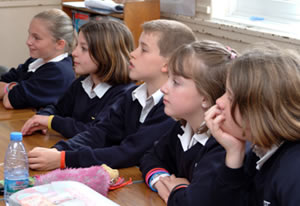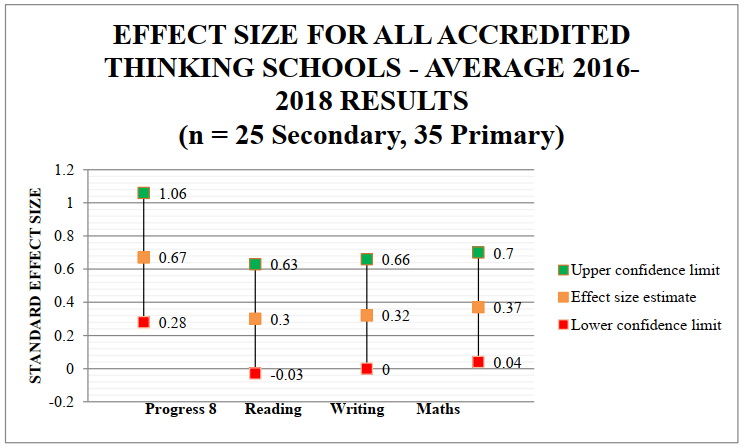TM Egypt Approach
It is hard to encompass a definition for a thinking school into one short, concise sentence. The following information aims to give an overview of what a thinking school is and some of the benefits that a thinking school can bring. First, the video…
Professor Bob Burden defines a thinking school as:
Children thinking in school ‘an educational community in which all members share a common commitment to giving regular careful thought to everything that takes place. This will involve both students and staff learning how to think reflectively, critically and creatively, and to employing these skills and techniques in the co-construction of a meaningful curriculum and associated activities. Successful outcomes will be reflected in student’s across a wide range of abilities demonstrating independent and co-operative learning skills, high levels of achievement and both enjoyment and satisfaction in learning. Benefits will be shown in ways in which all members of the community interact with and show consideration for each other and in the positive psychological well-being of both students and staff.’ (Burden, 2006)

5 Key Areas for Reflection and 15 Criteria for Thinking Schools
The Thinking Foundation offers a Thinking School Accreditation process. The framework they use for a school to achieve accreditation is based on 5 Key Areas for Reflection and 15 Criteria representing the vision of directly facilitating thinking as a foundation for early childhood through adult education and for nurturing all students as global citizens. These Key Areas and Criteria are useful descriptors for defining a Thinking School:
Key Area 1: Student Centered: Student centered thinking develops life-long, independent and cooperative learning skills including reflective, critical, and creative thinking and the capacity to solve problems and transform information into meaningful knowledge and action.
Key Area 2: Facilitative Leadership: Facilitative Leadership engages all members of the school community in interactions that promote group and individual learning, informed and thoughtful decisions, and a planned, sustained effort toward a common purpose.
Key Area 3: Integrated Professional Learning: This provides access to planned, connected and diverse opportunities for continuous learning and growth for individuals and groups within the adult school community in the thinking pathways the school has chosen.
Key Area 4: Interactive Assessment: Interactive Assessment is a continuous process of reflection on growth and development to inform both learner and instructional decision-making that engages teachers and learners in a variety of formative and summative approaches.
Key Area 5: School-Wide Ethos: School-Wide Ethos reflects the quality of the thought-filled interactions between and among people within the school and the larger educational community and the ways in which all members actively demonstrate respect for each other and the capacity to invite and consider multiple perspectives.
Professor Bob Burden provides another, longer definition of a Thinking School
‘Perhaps a more pertinent question is ‘what is a non-thinking school?’ Isn’t thinking a key component of most learning and isn’t student learning the primary function of all schools? Unfortunately, a great deal of evidence would appear to indicate that a significant proportion of pupils pass through their 15,000 hours of schooling without being required to do much real thinking at all. External tests and examinations are prepared for and passed at every level by means of drills and rote-memory exercises with the result that a great deal of superficial information may have been accumulated without any reflection on its value or the meaning. Meanwhile, the notion of an autonomous (and group orientated) learner and problem-solver has been completely lost.
The point here is not to blame schools, overwhelmed by the demands of covering a largely content-based curriculum and the potential costs of failing to do well in Ofsted inspections or being placed well down in unofficial media-based ‘league tables’. Our suggestion is that there is a viable alternative which has its foundation in a return to the purpose of producing educated citizens of the world.
The indications are that placing cognition at the heart of the education enterprise and developing ways of establishing explicit links between critical and creative thinking and high quality autonomous learning and pro-social behaviour can have enormous benefits for the students, the ethos of the schools, and for the wider community.
Our definition of a thinking school, therefore is an educational community in which all members share a common commitment to giving regular, careful thought to everything that takes place. This will involve learning how to think, reflectively, critically and creatively, and to employing these skills and techniques in the co-construction of a meaningful curriculum and associated activities. Successful outcomes will be reflected in students across a wide range of abilities demonstrating independent and co-operative learning skills, high levels of achievement, and both enjoyment and satisfaction in learning. Benefits will also be shown in ways which all members of the community interact with and show consideration for each other and in the positive psychological well-being of both students and staff.
In order to achieve this goal, a whole school approach will be necessary whereby all stakeholders (including parents and school governors) are fully committed to the school’s aims and how they can best be achieved. Staff will need to be specially trained and methods will need to be introduced into the curriculum for teaching the skills of thinking and associated cognitive and meta-cognitive strategies. The widest possible application of these skills and strategies should underpin all other aspects of the curriculum and should guide behaviour policies and expectations about human interactions at every level and care for the environment.
To become a thinking school requires (shared) vision, skilful in-service training and a great deal of hard work. In one sense, the process is never-ending, but we do believe that schools demonstrating that they can match a certain number of basic criteria can rightfully claim to be a thinking school. ‘ (Burden, 2006)
Exeter's Report
Progress outcomes, for 2016 to 2018 of primary and secondary age pupils in England are examined for schools which have (i) adopted a whole school approach to the teaching of thinking and have subsequently been accredited as a Thinking School, and (ii) have either been accredited as a Thinking School or who have registered and started the Thinking Schools journey.


